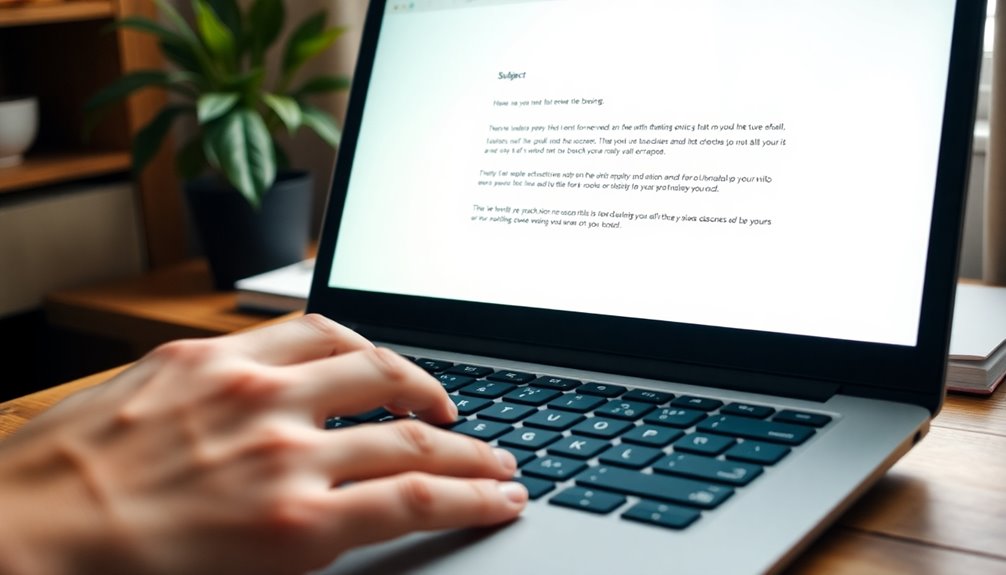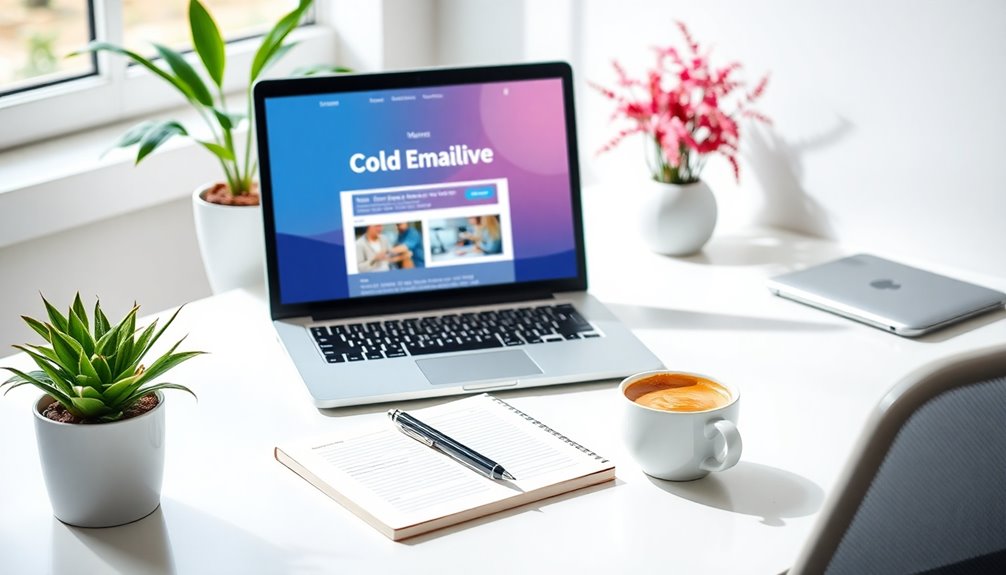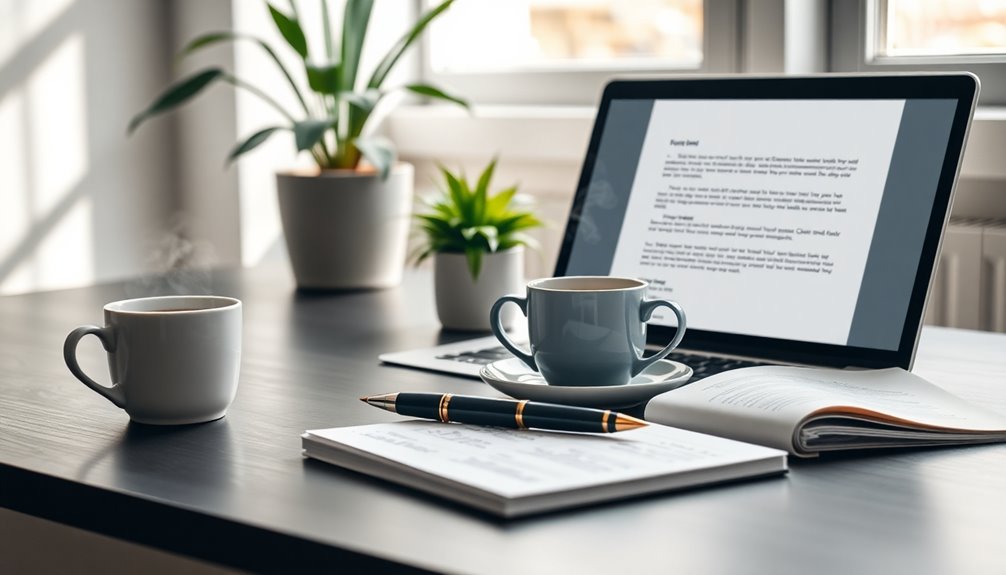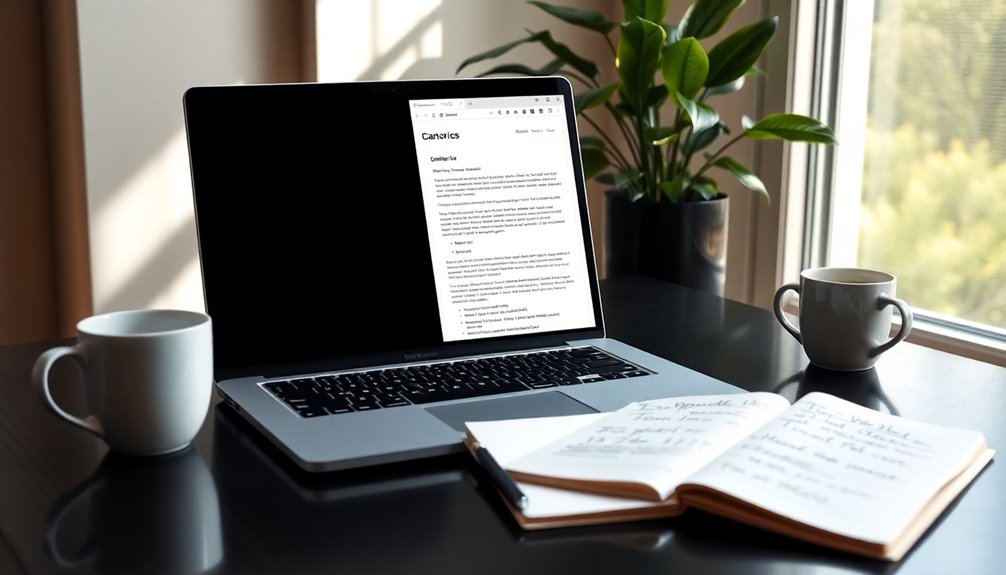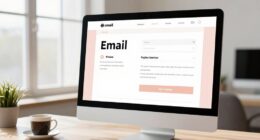To write an easy-to-understand email as a student, start with a clear and specific subject line that reflects the content. Use a polite greeting like "Dear Professor Smith" to set a professional tone. State your main purpose early, keeping the body concise. Avoid unnecessary details and use bullet points for clarity if needed. End with a polite closing, such as "Thank you," followed by your full name and relevant course information. Remember to proofread for errors. With these tips, you'll enhance your communication skills, and there's more useful advice to help you grow even further.
Key Takeaways
- Use clear and specific subject lines to convey the main topic of your email effectively.
- Start with a polite greeting, addressing the recipient respectfully by their title and last name.
- State your purpose early and keep the email concise, avoiding unnecessary details.
- Organize information with bullet points for clarity and to enhance readability.
- Close with a professional sign-off, including your full name and relevant details like course and class time.
Introduction

Writing an effective email is one of the most important skills you can develop as a student. It's not just about sending a message; it's about enhancing clarity and professionalism in your communication. Whether you're reaching out to a professor, applying for an internship, or collaborating with classmates, strong writing skills in formal emails can make a significant difference.
Start with a clear subject line that summarizes your email's purpose. This helps your recipient know what to expect and prioritizes your message. Next, use a polite greeting to set a respectful tone.
The body of your email should be concise, sticking to the main points while maintaining a formal tone that suits your audience. Don't overlook the importance of spelling and grammar—errors can detract from your professionalism. Additionally, being aware of your credit score can help you communicate effectively in financial contexts, especially when discussing internships or job opportunities.
Conclude with an appropriate closing and include your signature to give your email a polished finish. Practicing these steps won't only boost your confidence in writing professional emails but also reduce misunderstandings.
Builds Professional Relationships
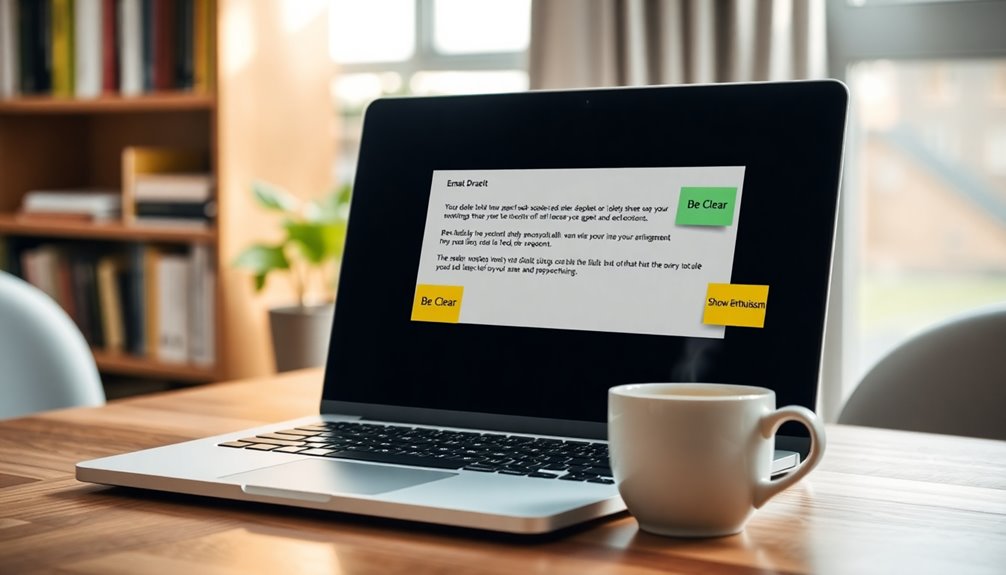
Effective email communication plays a crucial role in building professional relationships between students and educators. When you're writing a professional email, it's essential to follow formal email etiquette rules.
Start with a polite greeting, which sets a respectful tone right from the beginning. A thoughtful closing can also enhance the recipient's perception of you, reinforcing your professionalism. Additionally, astrology claims to influence personality traits and attractiveness, which can also apply to how you present yourself in email communication. Maintaining topical authority in your communication can also reflect your knowledge and engagement with the subject matter. Recognizing the importance of relationship dynamics can further enhance your email interactions. Using advanced segmentation techniques in your communication strategy can help you tailor your messages more effectively to your audience.
Using clear and concise subject lines is another crucial aspect. A well-defined subject line increases the likelihood of your email being opened and read, showing that you respect the recipient's time.
Tailoring your email's tone and content to your educator's preferences demonstrates your understanding of relationship dynamics, fostering more productive interactions. Regular, respectful communication through email helps build rapport with your educators. This consistent engagement can lead to better academic support and mentorship opportunities. Additionally, fostering a networking culture can enhance collaboration and open doors to new opportunities.
Remember, each email is a chance to strengthen your professional relationships, so make sure your writing reflects your commitment to effective communication.
Clear Subject Line
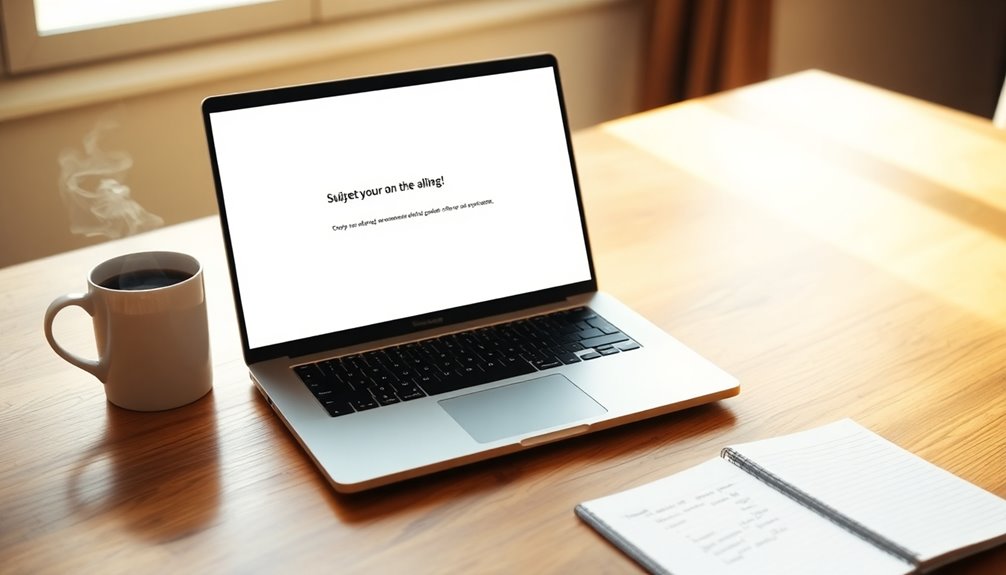
A clear subject line acts as a roadmap for your email, guiding the recipient to understand its purpose quickly. When you're writing a formal email, make sure your subject line is specific and informative. For example, instead of simply stating "Help!" or "Quick Question," opt for something like "Question Regarding MATH 181 Homework Assignment." This approach gives critical information right away.
Including your name and course in the subject line can enhance clarity, making it easier for the recipient to identify who you are, especially in a crowded inbox. Remember, a well-crafted subject line increases the likelihood of your email being opened and read promptly.
Keep it concise—ideally under 50 characters—to improve readability and fit within the display limits of most email clients. Avoid vague terms and ensure your tone of voice matches the professionalism of your email.
A clear subject line not only conveys the purpose of your communication but also reflects your respect for the recipient's time. By following these guidelines, you'll set a solid foundation for effective email communication.
Step-by-Step Guide to Writing to Professors
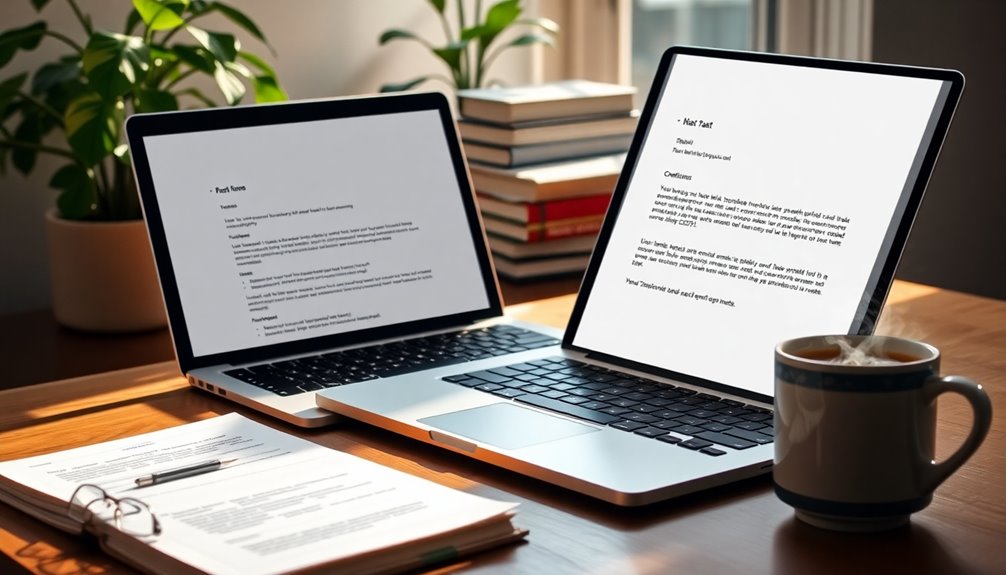
When reaching out to professors, it's essential to approach the email with both respect and clarity. Start by addressing your professor using their appropriate title, like "Professor" or "Dr." This shows professionalism and sets a respectful tone.
In your introduction, clearly state your full name, the course name, and the class time or section. This helps the professor identify you as the original recipient quickly.
Next, use a concise and specific subject line, such as "Question Regarding ENG 300 Assignment." This provides context and encourages a timely response.
In the body of your email, briefly explain the issue you're facing, outline any efforts you've made to resolve it, and clearly state your request for assistance. This structured approach makes it easier for your professor to help you. Additionally, remember that establishing healthy boundaries in communication can enhance the effectiveness of your interactions with professors.
Dos and Don'ts for Student Emails
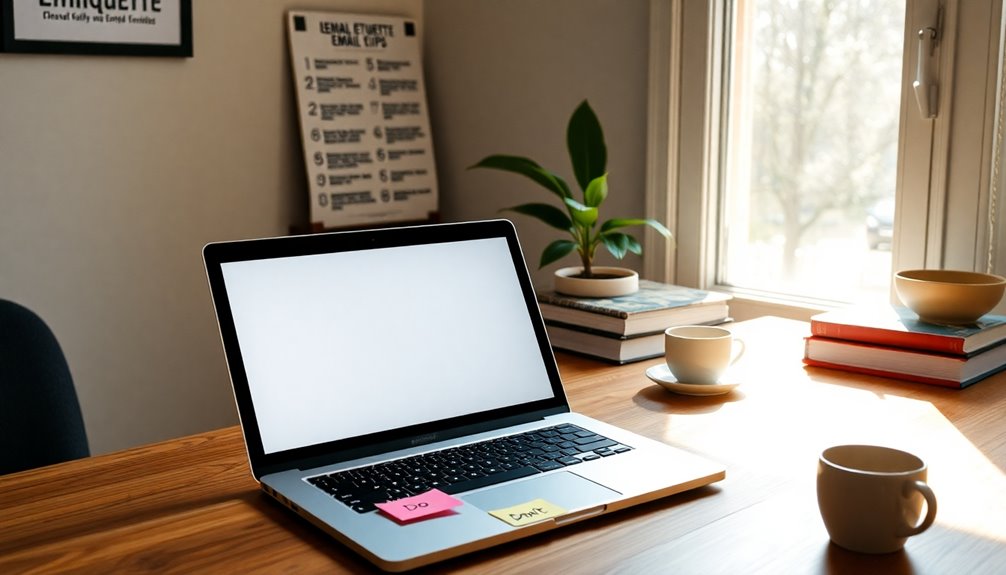
How to Write an Email for Students That's Easy to Understand!
Dos and Don'ts for Student Emails
Crafting emails to professors or academic staff can significantly impact your communication success. To ensure your emails are effective, here are some key dos and don'ts for students.
Do write a clear and informative subject line. This helps your recipient understand the purpose of your email right away. Additionally, keeping your emails aligned with positive affirmations can enhance your communication effectiveness. Establishing good oral hygiene habits early on can also improve your interactions, just as it does with children's dental health. Understanding the importance of environmental interactions can also help you frame your message more effectively. Using effective discipline strategies can help you navigate challenging conversations with clarity.
Also, include a polite greeting and closing; these set a respectful tone that fosters positive communication. When writing your professional email, keep it concise. Avoid overly long messages, as they may lose your reader's attention.
On the flip side, don't use informal language or slang. This can come off as disrespectful, especially in academic settings. Remember, you're aiming for professionalism.
Additionally, don't forget to proofread your email for grammar and spelling errors. Mistakes can undermine your credibility and the message you're trying to convey.
Lastly, understanding the importance of clear communication can enhance your relationship with professors, much like how effective parenting resources emphasize the need for open dialogue and clarity.
Student Email Samples
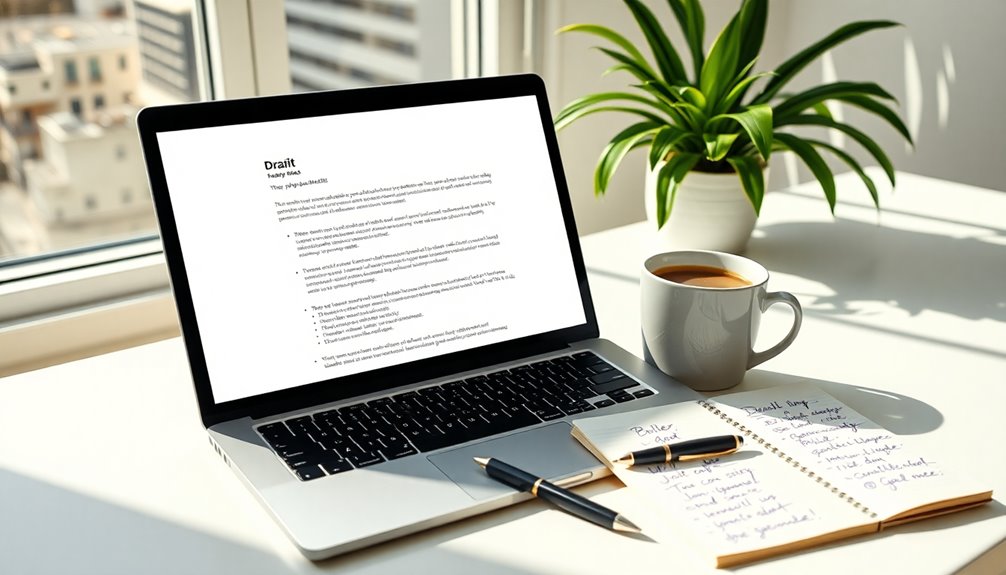
Effective student emails often serve as the first impression you make on professors and academic staff, so it's crucial to get them right.
To help you craft a solid email, here's an email example you can follow.
Subject: Request for Assistance with Chemistry Homework
Email Body:
Dear Professor Smith,
I hope this message finds you well. My name is Jane Doe, and I'm in your Chemistry 101 class, section 2B, which meets on Mondays and Wednesdays at 10 AM.
I'm reaching out because I'm struggling with the recent homework assignment on chemical equations. I've reviewed the lecture notes and attempted the problems but still find myself confused about certain concepts. Inadequate maintenance can lead to decreased efficiency in understanding complex topics. Many students experience brain fog which can exacerbate these challenges. Just as dogs require healthy snacks for optimal well-being, I believe I need additional support to improve my understanding. Protecting delicate skin from UV rays is also essential, as it can help prevent long-term issues.
I'd greatly appreciate any guidance or resources you could provide to help me understand better.
Additionally, I understand that clear communication is essential, much like how cold medications must be selected properly for effective relief.
Thank you for your time, and I look forward to your response.
Best regards,
Jane Doe
Chemistry 101, Section 2B
In this email, notice the clear subject line, professional greeting, and personal identifiers, which all contribute to clarity and respect.
Closing the email with gratitude enhances your professionalism and increases the chance of a helpful reply.
Pro Tips for Writing Effective Emails

Writing effective emails is essential for students looking to make a positive impression on their professors and academic staff. Start with a clear and informative subject line; this significantly increases open rates and lets the recipient know your email's purpose right away. Utilizing effective email marketing strategies, such as compelling subject lines, can improve your email's chances of being read.
Use a professional greeting, like "Dear [Title] [Last Name]," to set a respectful tone for your written communication.
In the body of your email, be concise and focused. State your purpose early on and outline any specific requests. For instance, if you'd appreciate assistance with a class project, make that clear. Personalization in your communication can also enhance engagement and encourage a prompt response.
Always remember to check your grammar, spelling, and punctuation before hitting send. This helps maintain professionalism and avoids misunderstandings that careless mistakes can cause.
Final Thoughts
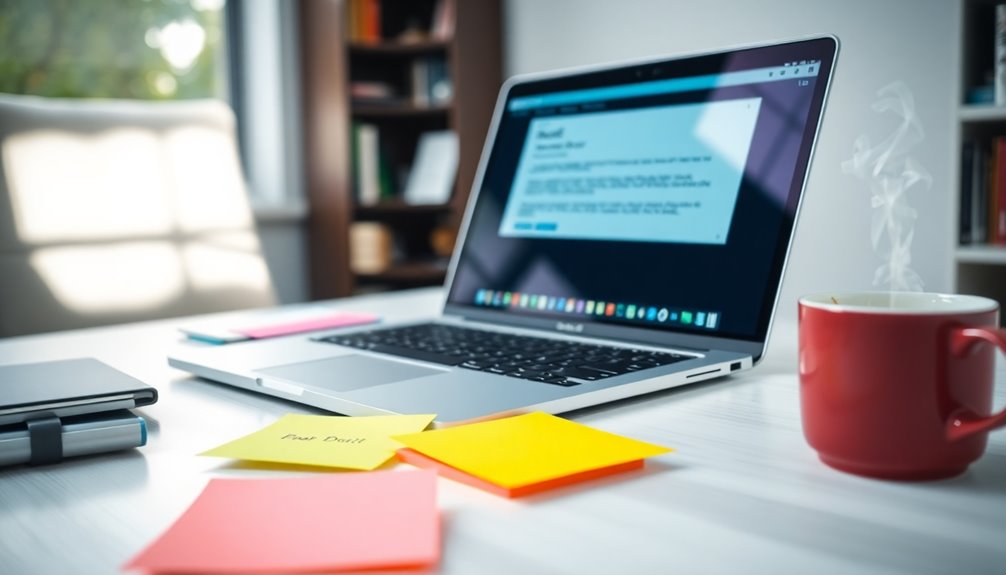
In conclusion, mastering the art of email communication can make a significant difference in your academic success. By focusing on writing separate emails for different subjects or requests, you ensure clarity and help your professors respond more efficiently. This approach mirrors the best practices outlined in effective communication strategies found in various resources.
Always double-check your email address to avoid sending messages to the wrong recipient. When you write an email, remember to maintain a professional tone and structure. This means using a clear subject line, a proper greeting, a concise body, and a respectful closing.
Your style of writing should be straightforward—avoid slang and emotional language that could confuse your message. Include specific details like your full name, course name, and class time, as these elements help your recipient identify you quickly.
Lastly, be mindful of the rules that govern effective communication. Just as you tailor your posts for social media, tailor your emails for professionalism. Following these guidelines not only showcases your communication skills but also fosters a positive impression, making it more likely you'll receive prompt and helpful responses. Additionally, practicing good email etiquette can enhance your public speaking skills and overall communication effectiveness.
Take these tips to heart, and you'll navigate email correspondence like a pro!
Frequently Asked Questions
How Do You Write an Email for Understanding?
To write an email for understanding, start with a clear subject line that reflects your main point.
Use a respectful greeting, like "Dear [Name]."
Introduce yourself briefly, then get straight to your question or issue.
Keep your language simple and avoid jargon, breaking up long paragraphs for easy reading.
Finally, ask for clarification politely and proofread your email to ensure it's clear and professional.
This approach promotes effective communication.
How to Start an Email as a Student?
To start an email as a student, you should greet your professor formally, like "Dear Professor [Last Name]."
In the first sentence, introduce yourself by including your full name, class, and section. This helps them recognize who you are.
Make sure your subject line is clear and relevant, such as "Question About Assignment."
Keep your tone polite and professional throughout the email, avoiding any casual language to maintain respect.
How Do You Write an Easy Email?
To write an easy email, start with a clear subject line that indicates your purpose.
Use a professional greeting to set the tone.
In your opening, state your reason for writing concisely.
Keep your message organized with short paragraphs or bullet points for clarity.
Highlight important information, and always end with a polite closing, thanking the recipient for their time.
Don't forget to include your full name and relevant details for identification.
What Is an Example of an Email for Students?
An example of an email for students could start with a clear subject line, like "Help with MATH 181."
You'd greet your professor respectfully, say, "Dear Professor Smith," and introduce yourself: "I'm John Doe from your MATH 181 class on Mondays at 10 AM."
In the body, explain your issue briefly and mention any steps you've taken.
